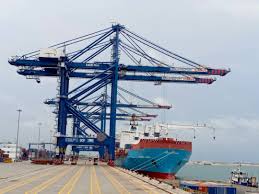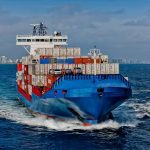Lekki Deep Sea Port, Nigeria’s first of its kind, has officially commenced transhipment operations to ports in neighbouring West African countries, including Togo, Ghana, and Abidjan in Côte d’Ivoire. The move marks a significant milestone for the country’s maritime industry, positioning Nigeria as a rising regional shipping hub.
Speaking with reporters in Lagos, Deputy Chief Operating Officer, Daniel Odibe, confirmed that the $1.5 billion port also recently conducted its first domestic transhipment trial to Onne Port in Rivers State, signalling plans to expand cargo movement within the country.
“We had our first transhipment in 2023—the first in Nigeria’s economy,” Odibe noted. “Now, we’re doing international transhipments to Ghana, Côte d’Ivoire, Abidjan, Togo, and Benin Republic. This marks a reversal of the old trend where Nigerian-bound cargo was routed through other West African ports.”
He explained that the lack of a functional deep seaport had previously forced Nigerian cargo to be handled in ports like Lomé and Tema before being shipped into Nigeria, increasing cost and delivery time. “With Lekki Port now operational, that transhipment story has changed in our favour,” he said.
Odibe revealed that the port handled 287,000 Twenty-foot Equivalent Units (TEUs) in 2024 but plans to grow this to 500,000 TEUs by the end of 2025. As of June 2025, the port had already processed 222,000 TEUs, despite current operations using only 20 percent of its full capacity of 1.2 million TEUs.
“Cargo volumes dropped last year due to economic disruptions—especially the removal of fuel subsidies and the depreciation of the naira. But we are now seeing signs of recovery,” he explained.
Lekki Port currently receives 10 to 12 vessels monthly, and vessel turnaround time averages 48 hours, with truck turnaround taking about 1 hour 25 minutes. Cargo dwell time remains at 16 days, but efforts are ongoing to further reduce delays through automation and better logistics coordination.
Looking ahead, Odibe said the port is working on expanding domestic transhipment routes to underserved ports like Warri, Calabar, and inland terminals such as Onitsha and Burutu. These ports are difficult for foreign vessels to access due to shallow drafts, but Lekki Port hopes to serve them using smaller feeder vessels.
He acknowledged that a trial domestic transhipment to Onne in 2024 encountered challenges but offered useful lessons. “We’re revisiting that process this year in partnership with shipping lines and logistics providers,” he said.
Also speaking at the event, Lekki Port’s Chief Operating Officer, Yang Xixiong, reaffirmed the company’s commitment to international standards, innovation, and efficiency.
“We continue to push the envelope and set the bar higher to maintain our position as West Africa’s deepest and most advanced seaport,” he said. “Our deployment of cutting-edge technology is transforming regional maritime trade and opening new trade corridors for Africa.”
Xixiong stressed that despite macroeconomic headwinds, Lekki Port is building momentum toward becoming a central logistics hub, not only for Nigeria but for the broader West African sub-region.
With an increasing focus on international and domestic transhipment, the port is poised to unlock new economic opportunities, boost non-oil exports, and reduce the country’s reliance on foreign ports for cargo redistribution.










